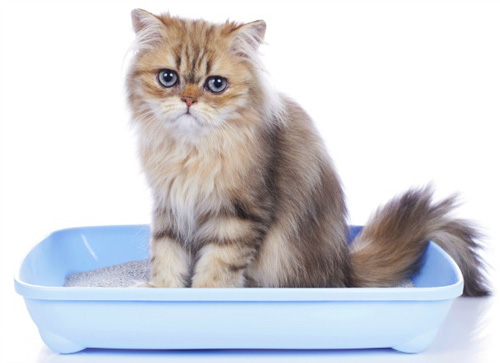To Pee or Not to Pee…..


Dr. Amy Sutherland
I have been a practicing veterinarian for 10 years now, and no one that knows me will argue that I have a fond love for my kitty patients. One of the most common complaints/questions I get asked by friends, family, or clients is, “why is my cat peeing on things?” Having multiple cats, I have had this smelly (and frustrating) situation in my own home. And although your first reaction is frustration, anger and asking your cat “WHY?????”, it most likely is not because they have decided to seek revenge on you for whatever reason. Sometimes it can be the first sign of a severe condition, which can ultimately threaten your cat’s life. The dreaded “Blocked Cat”….
Kidneys are “filter organs” meaning they filter out minerals, water, and reabsorb nutrients that our bodies need. They also “dump” toxins, or waste products, that build up by normal metabolism into the urine. As long as urine outflow is normal, and urination can occur, then all is well. The body is rid of the waste products and the kidneys are happy.

The problem comes in when there is an obstruction, or “plug” in the plumbing system called the lower urinary tract and urine flow stops. With this blockage, waste products build up and can lead to a life threatening situation, Kidney Failure. One of the most common ways that this can happen in male cats is when their urethra (the tube that carries urine from the bladder to the litter box) gets blocked, or plugged. The actual “plug” is usually made of a mixture of mucus and protein called a “matrix,” that is thick and collects crystals/debris from the urine and forms the blockage. How and why this matrix forms is still a mystery, like most things with cats…. but there are factors that can be addressed to help prevent and avoid this life threatening situation.
Common factors that can predispose to urethral blockages:
- stress
- lack of access to water/or not drinking much water
- poor nutritional diet
- indoor lifestyle
- obesity
- infectious agents/urinary tract infections
Signs that your cat may be blocked:
- straining repeatedly in litter box
- inappropriate urination (urinating outside the box, on towels, carpets, beds)
- crying or howling when urinating
- licking at genitals/below base of tail repeatedly
- hiding (more so than normal)
- not eating/vomiting
- grumpy or aggressive behavior
A Urinary Tract Infection (or UTI) can be the first step in the process that leads to the life-threatening Blocked Cat. It is important to realize early signs and get treatment to avoid the plug from forming. If caught early, antibiotics and anti- inflammatories can be prescribed to treat the UTI.
Signs of Urinary Tract Infection::
- excessive water drinking
- urinating only small amounts of urine at a time
- will notice ‘small clumps‘ of urine in litter box
- urinating frequently and in multiple spots
- inappropriate locations – towels, carpets/rugs, beds, etc
- bloody urine or strong odor to urine
If your kitty does unfortunately become obstructed it is EXTREMELY IMPORTANT to seek veterinary care ASAP!! Time is of the essence, and the MOST important thing that needs to be done for your kitty is for the blockage to be removed. This is an EMERGENCY and cannot wait! I cannot stress enough how important it is to bring your cat in for treatment right away!!
Immediate Treatment for a Blocked Cat:
- Sedation to pass a urinary catheter to relieve the blockage
- Diuresis, or flushing of kidneys, with either intravenous (IV) fluids or fluids under the skin
- Blood work to evaluate kidney function
- Urinalysis to evaluate for a UTI and assess kidney function
- Antibiotics and pain medications
Once the obstruction is cleared, and the kitty is stabilized, the urinary catheter will be kept in place for a minimum of 24-36 hours, based on length of time kitty was obstructed and the status of kidneys. If there is evidence of kidney damage (which we will be determine based off of blood work and urinalysis), with aggressive fluid therapy and treatment, more often than not we are able to clear the kidney failure. Unfortunately, there are instances where the kidney damage is permanent and longterm treatment is needed for the chronic kidney failure.
Based on how kitty responds to treatment, the urinary catheter is removed and kitty will be monitored very closely for urine production and flow. This is a critical time, and re-obstruction is most common in the immediate hours/days following catheter removal. It is usually recommended that kitty is hospitalized with a veterinarian for at least 24-48 hours after removal of the urinary catheter.
In a perfect world, kitty responds to the treatment and will be discharged with medications and sometimes a change of diet. It is VERY COMMON for there to be changes in urination after going home – sometimes bloody urine, different behavior habits of litter box. The MOST IMPORTANT thing at this time is to continue the medications/advise of your veterinarian and to be patient with kitty….He just escaped a life threatening situation and now is working with 8 lives. Please be sure to follow up with rechecks and having your veterinarian recheck urine in the next couple of weeks. Often times, a longer course of antibiotics is needed to clear the UTI completely. We definitely want to avoid re-blocking!
To summarize:
Things to do to Avoid Urethral Obstruction:
- Good quality diet, for indoor kitties – diet designed for less active cats
- Appropriate weight, in my experience most of my blocked cases have been in cats that had some extra weight on them
- Fresh water access, water fountains, encourage water drinking
- Fastidious cleaning of litter boxes – for two reasons:
- cats prefer a clean box, will decrease chances of inappropriate elimination for behavioral reasons (another blog topic coming soon!)
- if there are multiple, small spots of urine, this will be noticed sooner and is a chance to treat a UTI and avoid potential blockage
- Routine annual/semi-annual exams/urinalysis for all cats, especially if they are prone to getting UTI’s or have had a blockage in the past
AGAIN….if your kitty decides to surprise you with urinating in a place other than the litter box, chances are it is NOT just him being a butt…it could be the beginnings of a very serious situation! Bring him to your vet ASAP!
